Deluge Diaries | Year after floods, Ranni is a dazzling ghost town

Mail This Article
A pleasant surprise awaits anyone visiting Ranni town a year after the floods. The place looks magically transformed, as though touched by some life-giving boon.
On the midnight of August 14 last year, a normally sedate Pampa had suddenly assumed gigantic proportions and had gobbled up more than half the town that had risen up along its banks. When Onmanorama visited the town last September, it was badly crippled. The insides of the shops looked squashed and was stinky. On the outside, they looked dried and rotten. Some owners had even given up.
But a year later, the place looks swanky and clean, whole. Dust in the colour of faded gold that hung over the town like it was a cruel joke played by the devil is now gone. Shops shredded by a crazy Pampa now flaunt glossy name boards, have top quality glass fronts and squeaky clean marble floors. Most are still decked up in ornamental lights that had announced their reopening a few months ago. It looked like a festival of rebirth.
But it must be an absent-minded God who had pulled up Ranni from the dead. The shops look new and ready alright, but where are the buyers? The bride is ready in all her finery but there is no one to take her hand. Most of the shops wear an empty look. The traders had invested lakhs to get back on their feet. They had pushed themselves deeper into debt hoping that future business will compensate. It has not.
Most traders Onmanorama re-visited this September had the same story of customer desertion to narrate. In the months that Ranni was a dead town, its people had discovered shops in nearby places that were untouched by the floods.
"We have done our half of the job," said Abraham, a small stationery store owner who had spent nearly Rs 3 lakh to get back to business. "Now we expect God to do his half," he said.
Speed Biju: Two-wheeler mechanic
Biju's asbestos-roofed two-wheeler repair shop, called 'Speed', was in the backyard of the town, far behind the line of commercial establishments on the right side of the Mamukku-Ittiyappara stretch.
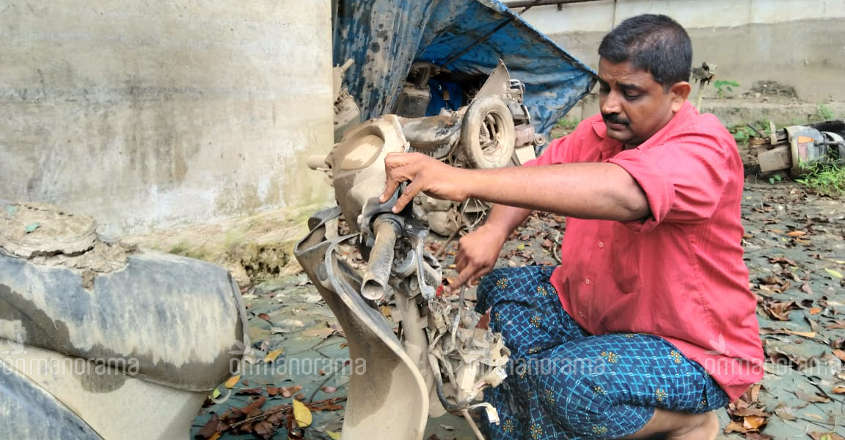
A month after the floods when Onmanorama visited, the place looked like a dried up swamp. The two-wheelers in his shop looked crushed and were half buried in thick mud. Back then, Biju was playing hide and seek with a couple of owners who were pestering him for money for their destroyed vehicle. "They behave as if I was the one responsible for the floods," Biju had then told us.
This September we found 'Speed' abandoned. A wild green undergrowth has taken over the place. We were told that Biju had shifted to a new place. Last time he had told us that he was eyeing an unused garage right in the heart of the town, near the bus stand.
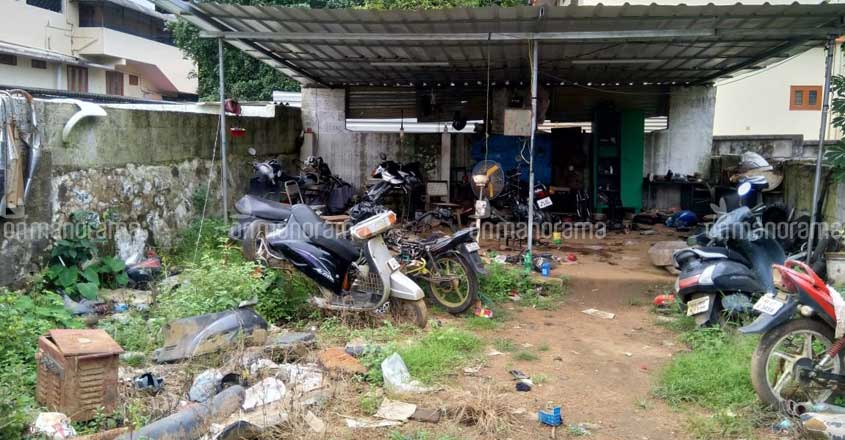
As it turned out, the new workshop was not inside the town but in an unused plot adjacent to his house some two kilometres away from the town. It was a long narrow plot and the workshop was at the far end. It had an asbestos roof and the perimeter wall of the plot doubled up as the back and sides of the shop. A tent-like ad hoc arrangement.
"He did not have the money to rent a new place. The owner of the garage he was keen to rent had asked for a huge sum," said Sindhu, Biju's wife. Biju was in Coimbatore. Sindhu said the floods had damaged all the two-wheelers at the shop beyond repair. "Biju usually purchased the necessary parts and then collected the money from the owners when their bikes are returned to them after repair. This way he had spent Rs 10,000 to 20,000 on some of the bikes. After the floods wrecked the two-wheelers, some of the owners asked us to compensate for their bikes. We had already lost some money and now these people were asking for more," Sindhu said.
Later, Biju told us over phone from Coimbatore that he had sold some of the bikes as scrap and gave that money to the owners. "They were unhappy, and some even felt insulted. But what am I to do," Biju said. Some of the mangled vehicle parts were not accepted even as scrap and are therefore dumped along the sides of Biju's new work place.
After the shift, business has come down. "No one now calls me for work," he said. Biju was in demand for his expertise in increasing the speed of a motorbike. Thus the name 'Speed Biju'. He had three assistants and now with work thinning out he could not afford them. "Thankfully, I did not have to terminate them. Knowing that I was out of work, all the three found themselves some work outside Ranni," Biju said.
Biju was already saddled with debt when the floods struck. "But then I had enough work to pay my interest. There used to be some 15 two-wheelers at my workshop any time. Now I will be lucky if I get at least five two-wheelers a month. Given the situation, is it any wonder that I have defaulted big time," he said with a laugh.
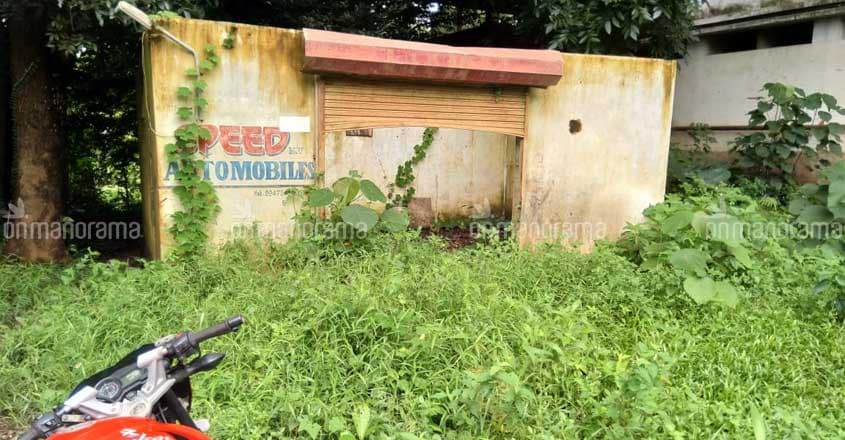
Five months ago, his mother was diagnosed with breast cancer. The doctor told him that an urgent operation could save his mother. Desperate for quick money, he borrowed Rs 3.5 lakh at exorbitant rates. The operation went well, and his mother is safe.
"I should have paid up Rs 50,000 last month. I have not. Right now I have no idea how I would repay the man who had helped me in a time of crisis," Biju said. It looks like Biju had bitten off more than he can chew.
Realising that his two-wheeler skill was not taking him anywhere, he had decided to revive his machine tool workshop. 'Speed Engineering Works', he has called it. He had mobilised Rs 12 lakh from various sources to re-condition the lathe, which too had gone under the water. "My wife has no idea about the debts I have incurred. I have twin daughters, and they are 18. It is time I saved some money for them," he said. "Suicide looks like an easy option. But I like to believe I am strong," he said.
Biju is now in Coimbatore hoping to get bulk orders for his little lathe. "I have been here for four days trying to convince a crusher manufacturer that I could provide him quality components. I can return home only if I get the order," Biju said.
Shaji: Hotel owner
Sarayu hotel looked almost exactly the way we had left it last September. An empty wooden glass shelf in front. Walls painted pink. The same two 40 watt bulbs up on the walls. Three broad desks covered in floral-patterned plastic table covers, arranged one after the other like in a classroom, and dark plastic chairs on either sides of these desks. The place obsessively neat.
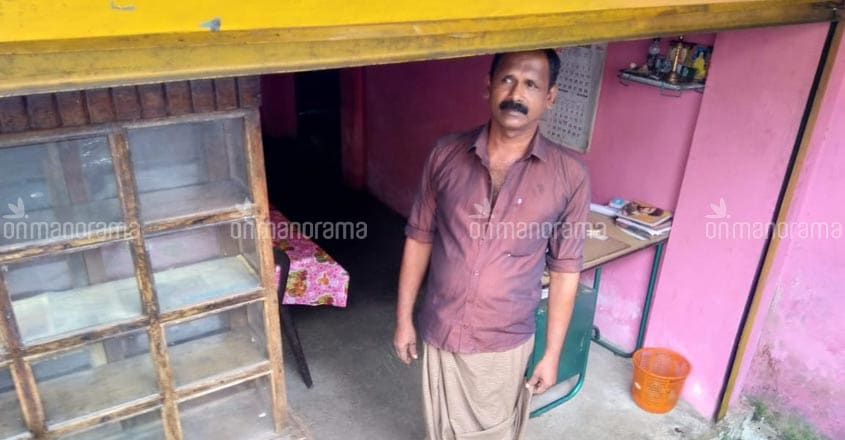
Last time, the slots for two ceiling fans were vacant. This time, the fans had appeared. There was one more difference. Last time the floor was still wet after the intense washing and restoration. It is a small shop below a flight of steps from the main town road, one of the few underground shops in Ranni. Being closer to the Pampa than most shops, it was badly mauled. All that was inside was destroyed, from desks and fans to the refrigerator and grinder. It took 15 days for Shaji, his wife Sarayu and and their two sons to clean up the slush and debris.
The grinder was repaired. But Shaji had done away with the refrigerator. After the floods, he had cut down the work hours. Before the deluge, Sarayu was open from morning till night. Now, it's shutters down after lunch.
The losses were too heavy for Shaji to continue employing kitchen staff and helpers. The entire operations – purchase, cooking, washing and serving – were taken over by the family: Shaji, his wife Sarayu, his two sons and a daughter. This self-sufficient 'shop as home' cost-cutting measure has helped the family stay afloat. This is also Sarayu's USP. "This is where my family eats, and what we serve here is what my children eat. Perhaps, that is why this place looks so neat," Shaji said with a smile.
The glass shelf in front is still empty. Last time Shaji had said that he would start selling tea and fill up the shelf with snacks like vada and pazham pori like it was before the floods. "In fact, tea was served for just about a month. But no one was coming and so we stopped," Shaji said.
These days some 15 to 20 people come for lunch, even less for breakfast. Sarayu's clientele includes people who pass by, mostly product representatives who frequently visit the town to deliver orders to shops, and also those who work in the jewellery and textile shops near Sarayu. "Some of our customers had vanished after the floods. When I inquired I was told they had been asked to leave by their employers. Business is so dull that shops here cannot employ many people," Shaji said.
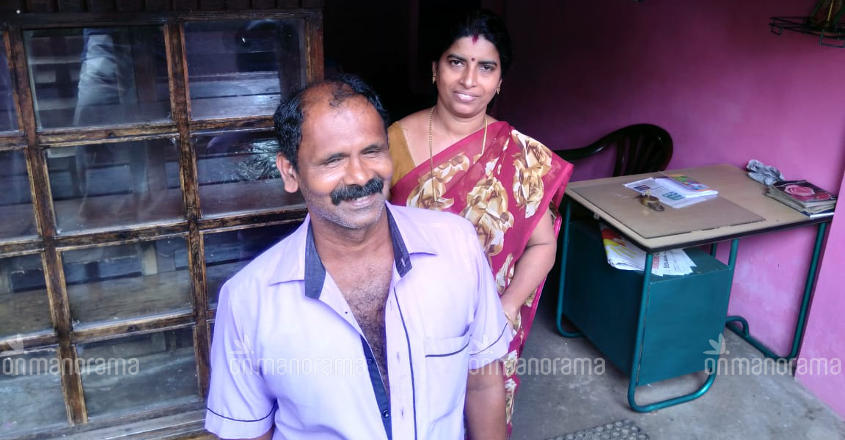
The floods had also given Ranni town a bad reputation. "Some tests had shown that our wells had e-coli bacteria found in human excreta. This might have also made people reluctant to visit small hotels in Ranni. Many of the employees I know, all friends of mine and former customers, now bring lunch from their homes," Shaji said.
Before the floods, Sarayu hotel sold nearly 100 lunches a day. Shaji said he had done good business when houses near the town had some activity, like weddings or construction. "Before the floods, there were lot many such activities going on. Maintenance work, weddings or other such get-togethers. During such occasions, people come to the town to buy things. Since it is mostly the workers who purchase stuff in bulk, it helps a small hotel like ours. The rich don't come to a place like this," Shaji said. "Nowadays, even if people want to buy anything, they drive to places like Erumeli and Mundakkayam," he added.
Shaji knows the Pampa can go mad any moment, and that his hotel would suffer the worst. Still, he has no plans to move out and find another place. "We don't have the money to purchase a plot and start anew there," he said. What if Pampa runs wild once again. "We will clean up and start all over again," Shaji said.
Excel Abraham: Jewellery shop owner
Last September, a month after the floods, Excel Abraham was the only polished presence inside his jewellery shop.
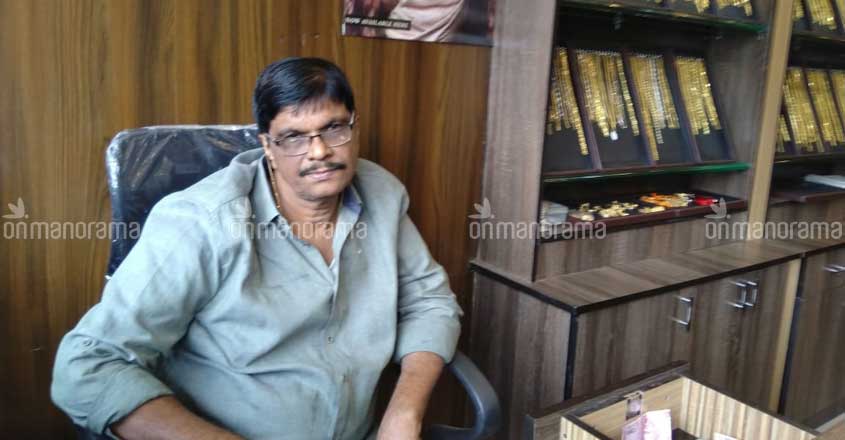
The Pampa had stripped the shop bare. The rewiring had just been done when we visited. The place looked like a grain godown. Bare smudgy concrete walls and some scratchy tables. It was hard to believe that this was just a few days ago the swankiest jewellery shop in town.
When we revisited, the shop was as it should be. Wood-panelled interiors, glass-topped counters, lighted wall-mounted glass boxes displaying gold jewellery, marble floors, and air-conditioned. Excel Abraham but was in a sullen mood. Last time he was full of confidence, even joking about the tragedy that had befallen him.
But this time he looked like a lost man. He was at his seat at the entrance. There was just one salesman. The air-conditioned shop was drowned in chapel-like silence. It was hard to begin a conversation. We managed to introduce ourselves. "What time is it," he asked. "Eleven forty-five," we said.
He kept looking at us for a few moments more, shaking his head up and down like a man lost in thoughts. "If you had come to my shop last July, you would have found it difficult to enter," he said in a near whisper. "And look at my place now. Nearly half the day is over and not a single soul has visited my shop," he said.
Excel Abraham did not lose his jewellery to the flood waters. He had carted them all to his ancestral home just up the hill behind the town. But his furniture and electrical fittings worth Rs 50 lakh were destroyed. Among the damaged items was an alloy-tester that had cost him Rs 25 lakh six years ago. He had already spent nearly Rs 30 lakh to make a come back.
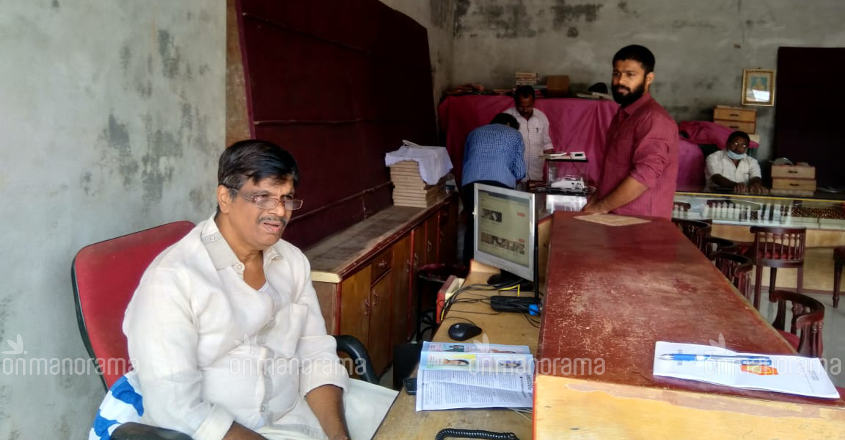
"It is wrong to complain. Others had suffered more and had invested considerably more than me to revive their businesses. But what is the point if no one wants any of what we sell," Abraham said.
Saju's Mini Super Shoppe, which is some 100 metres from Excel Jewellers, is the biggest FMCG store in town. "There is a de-growth of 50 to 60 per cent," Saju said. He had spent nearly Rs 50 lakh to get back to business. Most of his products – mixies, fans, induction cookers and LED TVs – were damaged by the floods. "The water rose right up to the ceiling. After the water receded, the only things left were the floor and the glass front," Saju said with his hand on his forehead, as if it was hard to believe that such a thing had ever happened.
Last time, he had stocked up big to meet the Onam demand. "I got some insurance for my destroyed goods but I had stocked up more goods than I had insured," Saju said. His shop is less crowded now. "I keep most of the stock in my godown that is a bit far from the town and where the waters will never reach," he said.
"There was no consumer interest during Onam. It was lower than even a non-festive month," Saju said. "There is a general feeling that shops in Ranni are selling goods that had gone under water and people here are going out to buy things," he said.
Right across the road from Saju's showroom is Bhavana Textiles. The place looked squeaky clean and packed with textiles. But there was not a single customer. Bhavana, the owner, was in the shop. There was an assistant, too. Before the floods, there were five girls to help her out. The entire shop, right up to the ceiling, was under water. "We could open the shop only two days later. By then the place had a rotten foul smell. Not a single item could be salvaged. All of it were given to some Tamilians for free," she said.
Bhavana had second thoughts about reopening. "But our suppliers from places like Mumbai and Kovilpattai in Tamil Nadu called us up and encouraged us to reopen. They said they will continue supplying goods and that we had to pay up only when we had enough money. Their support was a big relief," she said.
It has been over eight months since Bhavana Textiles reopened but the business is, in Bhavana's words, "unbelievably poor". "I think during the two months that it took for us to reopen our shops, our regular customers have found new shops in places that were not hit by the floods," she said.
The land phone rang and she picked up. Just when the receiver reached her face, she pushed it away in a sudden reflex. "This phone was also under water and the receiver still reeks of urine smell," she said.
Shameer: Fish vendor
The wayside fish stall at the end of the Ranni town, like all shops in Ranni, wore a deserted look. The stall is near a bus stop and there is a small crowd waiting for the bus.
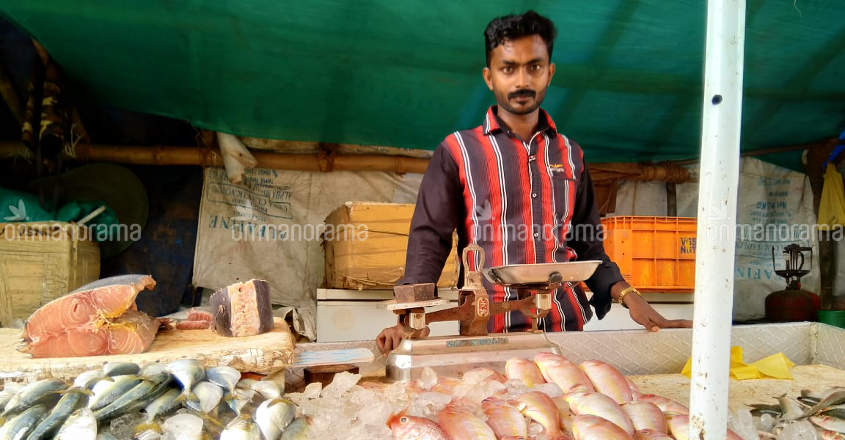
Last time when Onmanorama visited, the stall was manned by Shameer, a young man less than 30 years old. This time it was his older cousin Shibu at the stall. The same stuff we found last year was displayed in front: pink perch (kilimeen), mathi (sardine) and ayala (mackerel).
"Business has gone down for us after the floods," Shibu said. "But new fish stalls that have come up after the floods are doing good business. Somehow there is a feeling that stalls that were flooded sell poor quality fish. I don't know from where people have got such a notion," he said.
Shibu's pickings till 12 noon that day we visited the shop was Rs 310. It was a Thursday. "Thursday is not a market day. But even then, before the floods, we would have pocketed at least Rs 5,000 by this time. On a market day (Wednesdays and Fridays), it would be more than Rs 7,000," Shibu said.
Shibu pointed to a new fish stall diagonally across the road and said: "The owner ran a textile shop before the floods. After the floods destroyed his shop he first tried to revive the textiles. When it did not work, he opened a provision store at the same spot. When that too did not do much business, he opened a fish stall. In the last two months, he has opened two more fish stalls in the town," he said.
But the deserted old stalls had suffered heavy losses during the floods, too. The roof, refrigerator and fish stock worth Rs 1 lakh of Shameer's stall were washed away. "We did not get any compensation as this shop, as you can very well see, is on poromboke land," Shibu said.
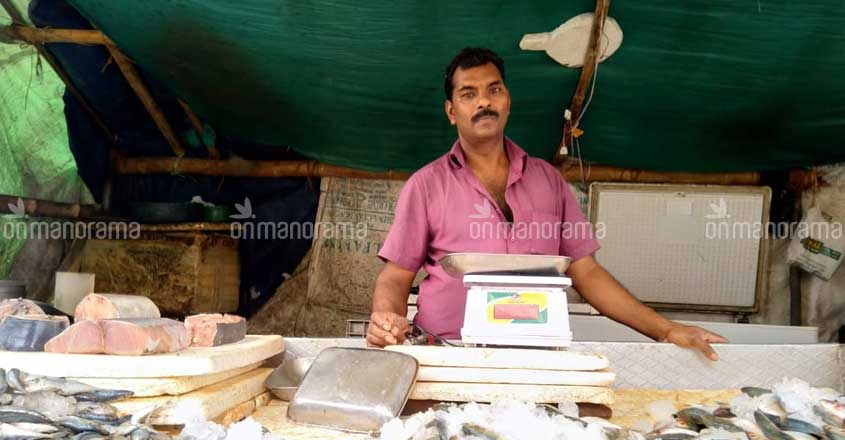
We asked about Shameer. "He was the one running the stall. Now he barely comes in the morning. He is trying to find other sources of income," his cousin said. We called up Shameer. He was in Alappuzha. "I am here to purchase two buffaloes for a marriage ceremony in our place. I do such odd jobs in the morning to shore up my income," Shameer said. He is married and has to look after an ailing father.
He said there was no point depending on fish sales alone for a living. "People in Ranni town somehow have stopped buying fish from our stall. It is not that demand for fish has gone down. It is perhaps the only item for which demand has not fallen in Ranni. New fish stalls that have opened after the floods get good business. It does not even matter that they have come up in places that were destroyed by the floods. Old stalls like ours that were affected by floods are seen as some kind of a curse," Shameer said.
But if he has still kept the shop open, there is a reason. "In the evenings, I take the unsold fish in my pick up van and take it to nearby areas like Erumeli, Aranmula and Ponkunnam. The people in these areas do not know that I come from Ranni or that I had a stall that was destroyed by the floods. So when I sell fish at a discount, they are only happy to buy from me," Shameer said.
He is also trying to establish himself in a new field. Real estate. "People in and around Ranni town are selling their lands like never before. With land prices falling, those from outside are keen to purchase plots. Since I know the place well, I think it is a big opportunity for me. I have already managed to complete 10 land deals that have earned me double than what I would have selling fish," he said.
Shameer said it was the same skill that he employed to sell fish that he now uses to sell land. "My silver tongue," he said, and let out a throaty laugh over phone.
(This is the concluding part of a series of stories from Onmanorama reporters from places ravaged by Kerala's August deluge in 2018)


